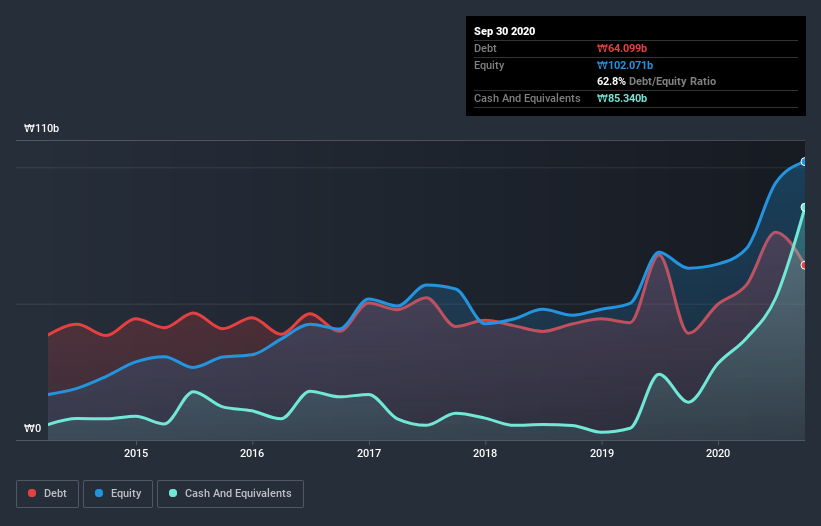Legendary fund manager Li Lu (who Charlie Munger backed) once said, 'The biggest investment risk is not the volatility of prices, but whether you will suffer a permanent loss of capital.' So it might be obvious that you need to consider debt, when you think about how risky any given stock is, because too much debt can sink a company. Importantly, Kukdong Corporation (KRX:005320) does carry debt. But the real question is whether this debt is making the company risky.
What Risk Does Debt Bring?
Debt is a tool to help businesses grow, but if a business is incapable of paying off its lenders, then it exists at their mercy. In the worst case scenario, a company can go bankrupt if it cannot pay its creditors. While that is not too common, we often do see indebted companies permanently diluting shareholders because lenders force them to raise capital at a distressed price. Of course, debt can be an important tool in businesses, particularly capital heavy businesses. The first thing to do when considering how much debt a business uses is to look at its cash and debt together.
View our latest analysis for Kukdong
How Much Debt Does Kukdong Carry?
You can click the graphic below for the historical numbers, but it shows that as of September 2020 Kukdong had ₩64.1b of debt, an increase on ₩39.2b, over one year. But it also has ₩85.3b in cash to offset that, meaning it has ₩21.2b net cash.

How Strong Is Kukdong's Balance Sheet?
We can see from the most recent balance sheet that Kukdong had liabilities of ₩78.0b falling due within a year, and liabilities of ₩25.5b due beyond that. Offsetting this, it had ₩85.3b in cash and ₩28.3b in receivables that were due within 12 months. So it can boast ₩10.2b more liquid assets than total liabilities.
This short term liquidity is a sign that Kukdong could probably pay off its debt with ease, as its balance sheet is far from stretched. Succinctly put, Kukdong boasts net cash, so it's fair to say it does not have a heavy debt load!
Although Kukdong made a loss at the EBIT level, last year, it was also good to see that it generated ₩34b in EBIT over the last twelve months. The balance sheet is clearly the area to focus on when you are analysing debt. But it is Kukdong's earnings that will influence how the balance sheet holds up in the future. So if you're keen to discover more about its earnings, it might be worth checking out this graph of its long term earnings trend.
Finally, a company can only pay off debt with cold hard cash, not accounting profits. While Kukdong has net cash on its balance sheet, it's still worth taking a look at its ability to convert earnings before interest and tax (EBIT) to free cash flow, to help us understand how quickly it is building (or eroding) that cash balance. Over the most recent year, Kukdong recorded free cash flow worth 55% of its EBIT, which is around normal, given free cash flow excludes interest and tax. This free cash flow puts the company in a good position to pay down debt, when appropriate.
Summing up
While we empathize with investors who find debt concerning, you should keep in mind that Kukdong has net cash of ₩21.2b, as well as more liquid assets than liabilities. So we are not troubled with Kukdong's debt use. When analysing debt levels, the balance sheet is the obvious place to start. But ultimately, every company can contain risks that exist outside of the balance sheet. We've identified 3 warning signs with Kukdong (at least 1 which is a bit concerning) , and understanding them should be part of your investment process.
When all is said and done, sometimes its easier to focus on companies that don't even need debt. Readers can access a list of growth stocks with zero net debt 100% free, right now.
When trading Kukdong or any other investment, use the platform considered by many to be the Professional's Gateway to the Worlds Market, Interactive Brokers. You get the lowest-cost* trading on stocks, options, futures, forex, bonds and funds worldwide from a single integrated account. Promoted
New: AI Stock Screener & Alerts
Our new AI Stock Screener scans the market every day to uncover opportunities.
• Dividend Powerhouses (3%+ Yield)
• Undervalued Small Caps with Insider Buying
• High growth Tech and AI Companies
Or build your own from over 50 metrics.
This article by Simply Wall St is general in nature. It does not constitute a recommendation to buy or sell any stock, and does not take account of your objectives, or your financial situation. We aim to bring you long-term focused analysis driven by fundamental data. Note that our analysis may not factor in the latest price-sensitive company announcements or qualitative material. Simply Wall St has no position in any stocks mentioned.
*Interactive Brokers Rated Lowest Cost Broker by StockBrokers.com Annual Online Review 2020
Have feedback on this article? Concerned about the content? Get in touch with us directly. Alternatively, email editorial-team (at) simplywallst.com.
About KOSE:A005320
ONTIDE
Manufactures and sells textile products in Mexico, Indonesia, Vietnam, Bangladesh, and the Philippines.
Flawless balance sheet and good value.
Market Insights
Community Narratives



